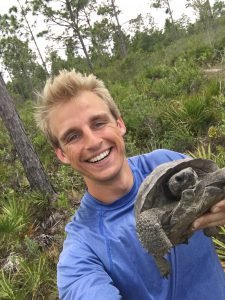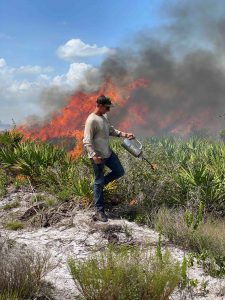By Katrina Rossos
University of Florida senior Jimmy Holdgrafer, a biology major with a minor in wildlife ecology and conservation, spent the summer as an intern at Lykes Ranch in Okeechobee, Florida. Lykes Ranch is a large agricultural operation that spans approximately 340,000 acres over Glades and Highlands counties. The ranch includes cattle, forestry, sugar cane, and other agricultural operations.
From collecting alligator eggs, to conducting prescribed burns for gopher tortoise habitat restoration, to surveying the deer population from a helicopter – Lykes offered an array of field experiences in wildlife management for Holdgrafer. He worked closely with on-site wildlife biologist Hunter Slade, whom Holdgrafer described as being a “wealth of knowledge”.
The beginning of the summer started with deer population estimates via night spotlight surveying and transitioned to daily aerial surveys. They collected data on age, sex, and quantity of deer. From these numbers the lead biologist calculated sustainable harvest rates of the deer at Lykes Ranch, which offers hunting leases and memberships. This management technique preserves the health and viability of the deer populations from year to year.

“It was interesting learning about what parts of the composition of the population you want to target and why,” Holdgrafer said, noting that older bucks are recommended to be hunted since they are the least likely to survive to the next year due to age.
Holdgrafer began the second phase of the summer conducting prescribed burns on acreage where threatened gopher tortoises are relocated. Gopher tortoises are a protected species in Florida and when land developers begin construction on a property, they are required to transport the reptiles to designated “recipient sites” throughout the state. Lykes Ranch is the largest recipient of gopher tortoises in the state, Holdgrafer explained. The areas where the gopher tortoises lived on the ranch were overgrown with shrubs and saw palmettos, preventing the growth of grass – the mainstay of this reptile’s diet – so burning was necessary.
“It’s been really cool learning more about fire ecology and the plant succession that takes place from the process and learning more about why we do prescribed burning,” Holdgrafer said. “It’s been great seeing us burn a unit and then coming back two weeks later and you can see the grass sprouting up, which is exactly what want for those gopher tortoises.”
The third stage of Holdgrafer’s summer internship involved riding around the ranch to locate and harvest alligator eggs. Lykes Ranch hires a crew to survey the property’s alligator nests, counting all of them; then, half of the total number of nests are harvested and the eggs are sold to alligator farms.
The fourth and final stage of Holdgrafer’s internship involved the opening of deer hunting season on Lykes Ranch’s hunting leases. Holdgrafer and his boss recorded measurements from harvested deer such as age and antler scores. This data is recorded to double check hunters are harvesting older bucks and to monitor the size and health of deer population on the ranch.
How it All Started
Originally from Fort Myers, Florida, Holdgrafer always had a love for the outdoors, which was particularly enhanced as a member of the boy scouts. While attending college, he realized how much he missed hiking and camping outside, and he wanted to get back to nature.
“I ended up going and spending so much time at Paynes Prairie, and so I kind of just then got back into backpacking and camping, and I just really realized that I was just very interested in ecology and being outdoors makes me happy, it just makes me feel good, it feels right, I feel very comfortable outdoors,” he said.
Holdgrafer is interested in wildlife and habitat management, particularly seeing what aspects of an ecosystem can be manipulated to achieve an ecological goal. He started out as pre-medical student, but after shadowing several professional doctors his sophomore year, he said he realized that the medical profession was a bit confining and not as rewarding as he anticipated.

Also as a sophomore, Holdgrafer participated in UF Biology’s Semester of Immersion Program where students take three five-week courses at different locations around the world. One of the courses Holdgrafer was in exposed him to wildlife research. During this class, he had to design an experiment, collect and analyze data, and write up the results. This experience solidified in him a desire to pursue a career as a wildlife biologist.
“It felt like it was hard work, but it was very fulfilling, and it just really appealed to me, so I just reflected on all those experiences when I was at that crossroads,” Holdgrafer explained.
From there, he started a minor in wildlife ecology and conservation and became involved with UF’s Chapter of The Wildlife Society (UFTWS). The organization helped him figure out his next steps moving forward, and provided professional development, certifications, and now internship opportunities – as he learned of Lykes Ranch internship through UFTWS.
“I’ve been very lucky to have met the right people who have put me in the right positions and given me the right knowledge to keep moving forward and develop experience and the course work needed to start this career,” said Holdgrafer.
While he initially applied as an intern at Lykes Ranch as an excited, but underqualified, sophomore, he secured the job after a full year with UFTWS and serving as the organization’s vice president as a junior.
“It was really awesome going from a year ago, knowing I was not very competitive for a position, to a year later going into the interview and being extremely confident that I was going to get the job and having that whole year of work pay off,” he described.
Future
Ultimately wanting to work for an agency or organization as a wildlife biologist, Holdgrafer currently plans on attaining a master’s degree in ecology or wildlife biology. Yet, he plans on working for a few years as a field technician after graduating UF in fall 2020 to gain a better understanding of what he may want to research in graduate school.

 0
0
